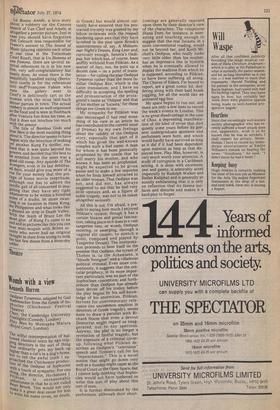Theatre
Womb with a view
henneth Hurren
2ediPus Tyrannus, adapted by Gail .Kadernacher from the Greek of SolThocles (Chichester Festival Theatre)
Ch the Cambridge University Wights (Comedy, London)
;,10)) Mas by Mustapha Matura Court, London)
The
Owed wilful reinterpretation of haled classical texts by ego-tripdirectors is the sort of thing fiat ordinarily gets my back up higher bu, than a cat's in a dog's home, to tell the awful truth I aplt).rDached the Chichester produc
tr inn bf the Oedipus of Sophocles ‘tith a touch of sympathy.
ilikianFor one piling, the director, Hovhannes I. u is unreasonably 132-1,1 nate in that he is not called 'Ler • Brook. This would not only inake to • it a great deal easier for him Write his name (even, no doubt, in Greek) but would almost certainly have ensured that his protracted travesty was greeted by my fellow reviewers with the respect bordering upon awe that they have lavished in the past upon Brook's mistreatments of, say, A Midsummer Night's Dream, King Lear and, curiously enough, Seneca's Oedipus, but which has, of course, been sniffily withheld from Pilikian. As a matter of fact, too, he puts up a decent case — on a point of translation — for calling the play Oedipus Tyrannus rather than the more familiar Oedipus 'Rex, which is the Latin translation; and I have no difficulty in accepting the spelling and pronunciation of the protagonist's name as `Oidipus' and that of his mother as locasta,' for these things are Greek to me.
My sympathy for Pilikian was also encouraged (I had read something of his view in an article he has contributed to the current issue of Drama) by my own feelings
about the validity of the Oedipus story, especially that part of it which has given the well-known complex such a bad name. A man for whom it has been prenatally prophesied by the oracle that he will marry his mother, and who knows it has been so prophesied, might be expected to be given pause and to make a few inquiries when he finds himself attracted to an older woman. That Oedipus was not, and did not, has always suggested to me that he had very little upstairs and, as a figure of noble tragedy, was not to be taken altogether seriously.
All this is not, I'm afraid, a prelude to saying how much I enjoyed Pilikian's version, though it has a certain bizarre and genial fascination, taking place as it does in a vast tangerine tent, or womb, Oedipus entering, or emerging, through a vaginal slit (music, to stretch a point, composed and played by Tangerine Dream). The interpretation proceeds to base itself on the premise that Oedipus, the tyrant of Thebes is, to the Athenians, a "bloody foreigner" and a villainous political criminal. Even more contentiously, it suggests that the oracular prophecy, in its more important particulars, was no part of the Sophoclean conception; and furthermore than Oedipus has already been driven off his trolley before the play begins by his self-knowledge of his enormities. Pilikian, fervent for contemporary relevance (no uncommon emotion in directors of Greek tragedy), seems keen to draw a parallel with Richard Nixon that even a devout Democrat might regard as exaggerated, not to say specious. Anyway, the play is no longer a revelation of fateful tragedy, but the exposure of a criminal coverup, following what Pilikian describes as Oedipus's "television" speech and Tiresias's call for his "impeachment." This is a novel notion that might go down very well as a Sunday-night caper at the Royal Court or the Open Space, but I cannot help thinking that Sophocies would not have bothered to write this sort of play about this sort of man.
It is further diminished by the performers, although their short
comings are generally imposed upon them by their director's view of the characters. The voluptuous Diana Dors, for instance, is interesting and touching enough to suggest that the real Jocasta, in a more conventional reading, would not be beyond her, and Keith Mi chell's Oedipus, who really looks very little older than his mother, has an impressive line in hysteria when he is eventually allowed to display the madness from which he is supposed, according to Pilikian, to have been suffering all along. The Chorus of Elders, I'm bound to report, are a great comic hit, doddering along with their bald heads joggling, for all the world like an animated egg-box.
My space begins to run out, and there are only a few lines to record the week's events in London. This is no great disadvantage in the case of Chox, a depressing manifestation of the kind of revue that died quietly some years before its present undergraduate sponsors and performers were born, and which would hardly have survived as long as it did if it had been dependent upon material as limp as that displayed here. Play Mas, however, is very much worth your attention. A study of corruption in a Caribbean setting, it is done with enormous zest and gaiety, is admirably acted (especially by Rudolph Walker and Stefan Kalipha) and is generally so sunnily exhilarating that it.is only on reflection that its theme surfaces and disturbs and makes it a hard play to forget.



























 Previous page
Previous page